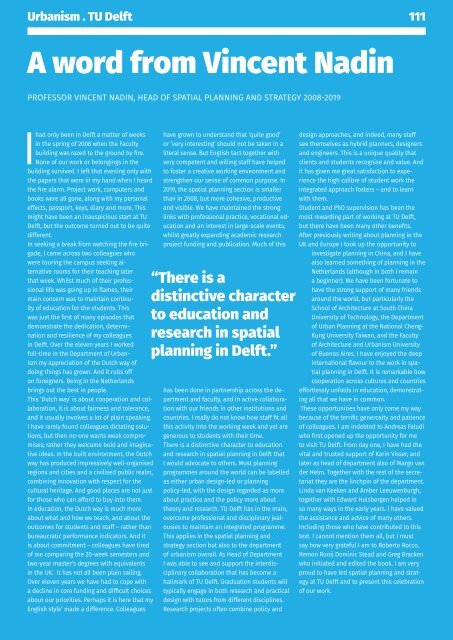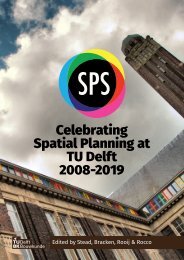*Celebrating Spatial Planning at TU Delft: 2008-2019. Edited by Stead, Bracken, Rooij & Rocco
This is a summary of the achievements of the session Spatial Planning & Strategy of the Department of Urbanism, Faculty of Architecture and the Built Environment, TU Delft, led by Professor Vincent Nadin between 2008 and 2019.
This is a summary of the achievements of the session Spatial Planning & Strategy of the Department of Urbanism, Faculty of Architecture and the Built Environment, TU Delft, led by Professor Vincent Nadin between 2008 and 2019.
You also want an ePaper? Increase the reach of your titles
YUMPU automatically turns print PDFs into web optimized ePapers that Google loves.
Urbanism . <strong>TU</strong> <strong>Delft</strong> 111<br />
A word from Vincent Nadin<br />
PROFESSOR VINCENT NADIN, HEAD OF SPATIAL PLANNING AND STRATEGY <strong>2008</strong>-2019<br />
I<br />
had only been in <strong>Delft</strong> a m<strong>at</strong>ter of weeks<br />
in the spring of <strong>2008</strong> when the Faculty<br />
building was razed to the ground <strong>by</strong> fire.<br />
None of our work or belongings in the<br />
building survived. I left th<strong>at</strong> evening only with<br />
the papers th<strong>at</strong> were in my hand when I heard<br />
the fire alarm. Project work, computers and<br />
books were all gone, along with my personal<br />
effects, passport, keys, diary and more. This<br />
might have been an inauspicious start <strong>at</strong> <strong>TU</strong><br />
<strong>Delft</strong>, but the outcome turned out to be quite<br />
different.<br />
In seeking a break from w<strong>at</strong>ching the fire brigade,<br />
I came across two colleagues who<br />
were touring the campus seeking altern<strong>at</strong>ive<br />
rooms for their teaching l<strong>at</strong>er<br />
th<strong>at</strong> week. Whilst much of their professional<br />
life was going up in flames, their<br />
main concern was to maintain continuity<br />
of educ<strong>at</strong>ion for the students. This<br />
was just the first of many episodes th<strong>at</strong><br />
demonstr<strong>at</strong>e the dedic<strong>at</strong>ion, determin<strong>at</strong>ion<br />
and resilience of my colleagues<br />
in <strong>Delft</strong>. Over the eleven years I worked<br />
full-time in the Department of Urbanism<br />
my appreci<strong>at</strong>ion of the Dutch way of<br />
doing things has grown. And it rubs off<br />
on foreigners. Being in the Netherlands<br />
brings out the best in people.<br />
This ‘Dutch way’ is about cooper<strong>at</strong>ion and collabor<strong>at</strong>ion,<br />
it is about fairness and tolerance,<br />
and it usually involves a lot of plain speaking.<br />
I have rarely found colleagues dict<strong>at</strong>ing solutions,<br />
but then no-one wants weak compromises;<br />
r<strong>at</strong>her they welcome bold and imagin<strong>at</strong>ive<br />
ideas. In the built environment, the Dutch<br />
way has produced impressively well-organised<br />
regions and cities and a civilised public realm,<br />
combining innov<strong>at</strong>ion with respect for the<br />
cultural heritage. And good places are not just<br />
for those who can afford to buy into them.<br />
In educ<strong>at</strong>ion, the Dutch way is much more<br />
about wh<strong>at</strong> and how we teach, and about the<br />
outcomes for students and staff – r<strong>at</strong>her than<br />
bureaucr<strong>at</strong>ic performance indic<strong>at</strong>ors. And it<br />
is about commitment – colleagues have tired<br />
of me comparing the 20-week semesters and<br />
two-year master’s degrees with equivalents<br />
in the UK. It has not all been plain sailing.<br />
Over eleven years we have had to cope with<br />
a decline in core funding and difficult choices<br />
about our priorities. Perhaps it is here th<strong>at</strong> my<br />
English style’ made a difference. Colleagues<br />
have grown to understand th<strong>at</strong> ‘quite good’<br />
or ‘very interesting’ should not be taken in a<br />
literal sense. But English tact together with<br />
very competent and willing staff have helped<br />
to foster a cre<strong>at</strong>ive working environment and<br />
strengthen our sense of common purpose. In<br />
2019, the sp<strong>at</strong>ial planning section is smaller<br />
than in <strong>2008</strong>, but more cohesive, productive<br />
and visible. We have maintained the strong<br />
links with professional practice, voc<strong>at</strong>ional educ<strong>at</strong>ion<br />
and an interest in large-scale events,<br />
whilst gre<strong>at</strong>ly expanding academic research<br />
project funding and public<strong>at</strong>ion. Much of this<br />
“There is a<br />
distinctive character<br />
to educ<strong>at</strong>ion and<br />
research in sp<strong>at</strong>ial<br />
planning in <strong>Delft</strong>.”<br />
has been done in partnership across the department<br />
and faculty, and in active collabor<strong>at</strong>ion<br />
with our friends in other institutions and<br />
countries. I really do not know how staff fit all<br />
this activity into the working week and yet are<br />
generous to students with their time.<br />
There is a distinctive character to educ<strong>at</strong>ion<br />
and research in sp<strong>at</strong>ial planning in <strong>Delft</strong> th<strong>at</strong><br />
I would advoc<strong>at</strong>e to others. Most planning<br />
programmes around the world can be labelled<br />
as either urban design-led or planning<br />
policy-led, with the design regarded as more<br />
about practice and the policy more about<br />
theory and research. <strong>TU</strong> <strong>Delft</strong> has in the main,<br />
overcome professional and disciplinary jealousies<br />
to maintain an integr<strong>at</strong>ed programme.<br />
This applies in the sp<strong>at</strong>ial planning and<br />
str<strong>at</strong>egy section but also to the department<br />
of urbanism overall. As Head of Department<br />
I was able to see and support the interdisciplinary<br />
collabor<strong>at</strong>ion th<strong>at</strong> has become a<br />
hallmark of <strong>TU</strong> <strong>Delft</strong>. Gradu<strong>at</strong>ion students will<br />
typically engage in both research and practical<br />
design with tutors from different disciplines.<br />
Research projects often combine policy and<br />
design approaches, and indeed, many staff<br />
see themselves as hybrid planners, designers<br />
and engineers. This is a unique quality th<strong>at</strong><br />
clients and students recognise and value. And<br />
it has given me gre<strong>at</strong> s<strong>at</strong>isfaction to experience<br />
the high calibre of student work the<br />
integr<strong>at</strong>ed approach fosters – and to learn<br />
with them.<br />
Student and PhD supervision has been the<br />
most rewarding part of working <strong>at</strong> <strong>TU</strong> <strong>Delft</strong>,<br />
but there have been many other benefits.<br />
After previously writing about planning in the<br />
UK and Europe I took up the opportunity to<br />
investig<strong>at</strong>e planning in China, and I have<br />
also learned something of planning in the<br />
Netherlands (although in both I remain<br />
a beginner). We have been fortun<strong>at</strong>e to<br />
have the strong support of many friends<br />
around the world, but particularly the<br />
School of Architecture <strong>at</strong> South China<br />
University of Technology, the Department<br />
of Urban <strong>Planning</strong> <strong>at</strong> the N<strong>at</strong>ional Cheng-<br />
Kung University Taiwan, and the Faculty<br />
of Architecture and Urbanism University<br />
of Buenos Aires. I have enjoyed the deep<br />
intern<strong>at</strong>ional flavour to the work in sp<strong>at</strong>ial<br />
planning in <strong>Delft</strong>. It is remarkable how<br />
cooper<strong>at</strong>ion across cultures and countries<br />
effortlessly unfolds in educ<strong>at</strong>ion, demonstr<strong>at</strong>ing<br />
all th<strong>at</strong> we have in common.<br />
These opportunities have only come my way<br />
because of the terrific generosity and p<strong>at</strong>ience<br />
of colleagues. I am indebted to Andreas Faludi<br />
who first opened up the opportunity for me<br />
to visit <strong>TU</strong> <strong>Delft</strong>. From day one, I have had the<br />
vital and trusted support of Karin Visser, and<br />
l<strong>at</strong>er as head of department also of Margo van<br />
der Helm. Together with the rest of the secretari<strong>at</strong><br />
they are the linchpin of the department.<br />
Linda van Keeken and Amber Leeuwenburgh,<br />
together with Edward Hulsbergen helped in<br />
so many ways in the early years. I have valued<br />
the assistance and advice of many others.<br />
Including those who have contributed to this<br />
text. I cannot mention them all, but I must<br />
say how very gr<strong>at</strong>eful I am to Roberto <strong>Rocco</strong>,<br />
Remon <strong>Rooij</strong> Dominic <strong>Stead</strong> and Greg <strong>Bracken</strong><br />
who initi<strong>at</strong>ed and edited the book. I am very<br />
proud to have led sp<strong>at</strong>ial planning and str<strong>at</strong>egy<br />
<strong>at</strong> <strong>TU</strong> <strong>Delft</strong> and to present this celebr<strong>at</strong>ion<br />
of our work.




